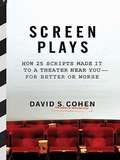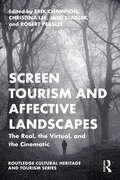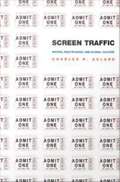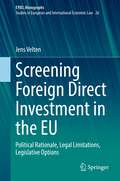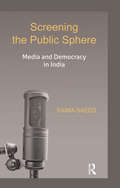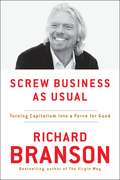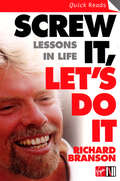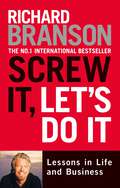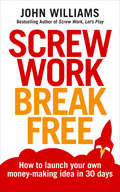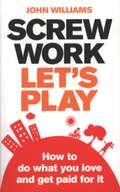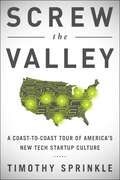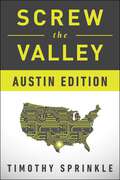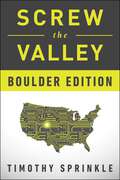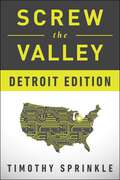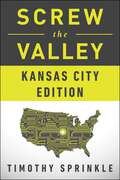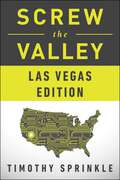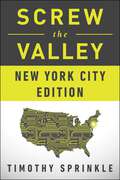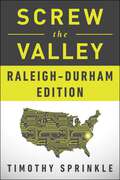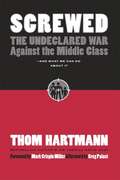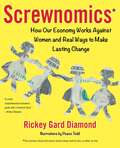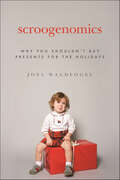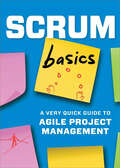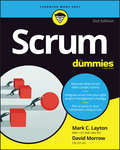- Table View
- List View
Screen Plays: How 25 Scripts Made It to a Theater Near You--for Better or Worse
by David S. CohenIn this fascinating survey of contemporary screen craft, David Cohen of Script and Variety magazines leads readers down the long and harrowing road every screenplay takes from idea to script to screen. In interviews with Hollywood screenwriters from across the board-Oscar winners and novices alike-Cohen explores what sets apart the blockbuster successes from the downright disasters. Tracing the fortunes of twenty-five films, including Troy, Erin Brockovich, Lost in Translation, and The Aviator, Cohen offers insider access to back lots and boardrooms, to studio heads, directors, and to the over-caffeinated screenwriters themselves. As the story of each film evolves from the drawing board to the big screen, Cohen proves that how a script is written, sold, developed, and filmed can be just as dramatic and intriguing as the movie itself-especially when the resulting movie is a fiasco. Covering films of all kinds-from tongue-in-cheek romps like John Waters's A Dirty Shame to Oscar winners like Monster's Ball and The Hours-Screen Plays is an anecdote-filled, often inspiring, always revealing look at the alchemy of the movie business. With Cohen as your expert guide, Screen Plays exposes how and why certain films (such as Gladiator) become "tent poles," those runaway successes every studio needs to survive, and others become train wrecks. Full of critical clues on how to sell a script-and avoid seeing it destroyed before the director calls Action!-it's the one book every aspiring screenwriter will find irresistible.
Screen Tourism and Affective Landscapes: The Real, the Virtual, and the Cinematic (Routledge Cultural Heritage and Tourism Series)
by Erik Champion Christina Lee Jane Stadler Robert Moses PeasleeThis book explores ways in which screen-based storyworlds transfix, transform, and transport us imaginatively, physically, and virtually to the places they depict or film. Topics include fantasy quests in computer games, celebrity walking tours, dark tourism sites, Hobbiton as theme park, surf movies, and social gangs of Disneyland. How physical, virtual, and imagined locations create a sense of place through their immediate experience or visitation is undergoing a revolution in technology, travel modes, and tourism behaviour. This edited collection explores the rapidly evolving field of screen tourism and the affective impact of landscape, with provocative questions and investigations of social groups, fan culture, new technology, and the wider changing trends in screen tourism. We provide critical examples of affective landscapes across a wide range of mediums (from the big screen to the small screen) and locations. This book will appeal to students and scholars in film and tourism, as well as geography, design, media and communication studies, game studies, and digital humanities.
Screen Traffic: Movies, Multiplexes, and Global Culture
by Charles R. AclandIn Screen Traffic, Charles R. Acland examines how, since the mid-1980s, the U. S. commercial movie business has altered conceptions of moviegoing both within the industry and among audiences. He shows how studios, in their increasing reliance on revenues from international audiences and from the ancillary markets of television, videotape, DVD, and pay-per-view, have cultivated an understanding of their commodities as mutating global products. Consequently, the cultural practice of moviegoing has changed significantly, as has the place of the cinema in relation to other sites of leisure. Integrating film and cultural theory with close analysis of promotional materials, entertainment news, trade publications, and economic reports, Acland presents an array of evidence for the new understanding of movies and moviegoing that has developed within popular culture and the entertainment industry. In particular, he dissects a key development: the rise of the megaplex, characterized by large auditoriums, plentiful screens, and consumer activities other than film viewing. He traces its genesis from the re-entry of studios into the movie exhibition business in 1986 through 1998, when reports of the economic destabilization of exhibition began to surface, just as the rise of so-called e-cinema signaled another wave of change. Documenting the current tendency toward an accelerated cinema culture, one that appears to arrive simultaneously for everyone, everywhere, Screen Traffic unearths and critiques the corporate and cultural forces contributing to the "felt internationalism" of our global era.
Screening Foreign Direct Investment in the EU: Political Rationale, Legal Limitations, Legislative Options (European Yearbook of International Economic Law #26)
by Jens VeltenForeign Direct Investment (FDI) from third countries—a desirable form of investment to boost the EU’s economy or a threat to important EU and Member State interests that must be mitigated via FDI screening mechanisms? FDI screening is a complex, controversial and highly topical subject at the intersection of law, politics and economics. This book analyzes the political rationale behind FDI screening in the EU, reveals the legal limitations of current FDI screening mechanisms based on security and public order, and identifies legislative options for broader screening mechanisms in accordance with EU and international economic law. In particular, the book identifies the four main concerns in the EU regarding FDI from third countries: distortive competition effects; the lack of reciprocity on FDI treatment between the EU and the investor’s home country; objectives of the investor or their home country that may be detrimental to EU interests; and safety of private information. On this basis, the book analyzes the Screening Regulation (Regulation (EU) 2019/452) and its newly introduced screening ground “security or public order” and asks whether this and other similar screening grounds based on the notions of security, public order and public policy can address these concerns with regard to foreign investors. Based on an analysis of WTO law and EU primary law, it argues that they cannot. Thus, the question arises: Do the EU and Member States have the flexibility to adopt broader FDI screening mechanisms? To answer this question, the book examines the freedoms of capital movement and establishment in EU primary law, as well as various sources of international economic law such as, first and foremost, the WTO’s General Agreement on Trade in Services, but also other bi- and plurilateral trade and investment treaties, including the EU-China Comprehensive Agreement on Investment. In closing, the book identifies various legislative options for broader FDI screening mechanisms—and their shortcomings.
Screening the Public Sphere: Media and Democracy in India
by Saima SaeedFor centuries, democracy and development have steered the imagination of governments, citizens, intelligentsia and policymakers alike. Democracy without free media is a contradiction, while development without democracy is futile. Highlighting the power and significance of contemporary media, this book deconstructs news and news-making on Indian television. In exploring the concepts of ‘sense-making’ and ‘meaning-generation’, it examines how news and the dissemination of information and opinion influence the public sphere, participatory democracy, citizenship and civil society. Providing an original interpretation of the paradigmatic shifts in news content and newsroom practices, this book focuses on changing ownership patterns, increasing ‘entertainmentalization’ of news and the resultant ‘developmental reportage deficit’. At the same time, it confronts the uneasy and critical consequences of commercialization and rising sensationalism in news media. Finally, it discusses the role of Public Service Broadcasting, journalistic ethics, objectivity, and the politics of language and ideology in the media today, pointing to the need for greater diversity of content on the one hand and an emphasis on public interest in media policy-making, on the other. Drawing upon comprehensive empirical data, the democracy–media–development relationship is demonstrated through critical analyses of the media’s coverage of recent news events. This includes exhaustive content examination of news programmes on all major news channels of India, surveys with media experts and news professionals by way of questionnaires, and interviews with the audience to gauge the impact of media content on their understanding of social, political and economic issues. This volume will be especially useful to those in journalism, media and communication studies, as also to students of political science, sociology and economics.
Screw Business As Usual
by Richard BransonRICHARD BRANSON, one of the world's most famous and admired business leaders, argues that it's time to turn capitalism upside down-to shift our values from an exclusive focus on profit to also caring for people, communities and the planet As he writes: "It's a vibrant and definite sea change from the way business was always done, when financial profit was a driving force. Today, people aren't afraid to say, Screw business as usual!-and show they mean it. "It's amazing how I keep coming across the same message, from bustling global cities to the townships of South Africa to small villages in India to G8 climate conferences. "It's no coincidence that so many people are talking about the same thing. There's a real buzz in the air. Change is happening. "People often associate me with challenges, with trying to break records while sailing the Atlantic or flying in a jet stream in a balloon or going into space with Virgin Galactic. But this book isn't just about fun and adventure and exceeding one's wildest dreams. It's a different kind of business book. It's about revolution. My message is a simple one: business as usual isn't working. In fact, business as usual is wrecking this planet. Resources are being used up; the air, the sea, the land are all heavily polluted. The poor are getting poorer. Many are dying of starvation or because they can't afford a dollar a day for lifesaving medicine. "But my message is not all doom and gloom. I will describe how I think business can help fix things and create a more prosperous world for everyone. I happen to believe in business because I believe that business is a force for good. By that I mean that doing good is good for business. "
Screw It, Let's Do It: Lessons In Life
by Richard BransonThroughout my life I have achieved many remarkable things. In Screw It, Let's Do It, I will share with you my ideas and the secrets of my success, but not simply because I hope they'll help you achieve your individual goals. Today we are increasingly aware of the effects of our actions on the environment, and I strongly believe that we each have a responsibility, as individuals and organisations, to do no harm. I will draw on Gaia Capitalism to explain why we need to take stock of how we may be damaging the environment, and why it is up to big companies like Virgin to lead the way in a more holistic approach to business. In Screw It, Let's Do It I'll be looking forwards to the future. A lot has changed since I founded Virgin in 1968, and I'll explain how I intend to take my business and my ideas to the next level and the new and exciting areas - such as launching Virgin Fuels - into which Virgin is currently moving. But I have also brought together all the important lessons, good advice and inspirational adages that have helped me along the road to success. Ironically, I have never been one to do things by the book, but I have been inspired and influenced by many remarkable people. I hope that you too might find a little inspiration between these pages.
Screw It, Let's Do It: Lessons in Life and Business
by Richard BransonRichard Branson is an iconic businessman. In Screw It, Let's Do It, he shares the secrets of his success and the invaluable lessons he has learned over the course of his remarkable career. As the world struggles with the twin problems of global recession and climate change, Richard explains why it is up to big companies like Virgin to lead the way in finding a more holistic and environmentally friendly approach to business. He also looks to the future and shares his plans for taking his business and his ideas to the next level.Richard reveals the new and exciting areas into which Virgin is currently moving, including biofuels and space travel, and brings together all the important lessons, good advice and inspirational adages that have helped him along the road to success. This is a fantastic motivational business book that will help every reader achieve their own dreams.
Screw Work Break Free: How to launch your own money-making idea in 30 days
by John WilliamsLet John Williams teach you how to get up and running with a money-making idea you love in just 30 days - even if you haven't yet found your killer concept. Drawing on the latest methods of famous creatives and billion-dollar startups you'll discover* 3 steps to find a money-making idea to run with* The instant procrastination fix* 11 ways to make money out of any idea* How to make your idea go viral* Secrets you can use from multi-million dollar launchesCase studies and stories will keep you motivated and simple confidence hacks will help you get yourself out there. You'll get access to the Break Free Toolkit online, connect with other readers on social media, and launch your idea in as little as 20 minutes a day. Welcome to the idea age!
Screw Work, Let's Play: How To Do What You Love and Get Paid For It
by John WilliamsScrew Work, Lets Play will show readers why they will have far greater success, happiness and wealth from playing all day. You're tired of being stuck between boring work that pays and fun stuff that doesn't. You want to be able to do whatever is most fun and exciting for you from day to day, to learn new stuff, to be creative, to express yourself and to do something you actually care about. You want to get paid simply for being you. Screw Work, Lets Play, will show readers why the most successful people in the world do exactly that, just think, Richard Branson, Steve Jobs and Warren Buffet all became billionaires by having fun, and they can too starting right now. This book will help readers discover what they enjoy the most and what playing all day looks like for them. It gives life changing strategies to transform their working lives and reveals the huge variety of ways to get paid and play, not only ensuring more fun, but helping them to increase the amount of money they make.
Screw the Valley: A Coast-to-Coast Tour of America's New Tech Startup Culture: New York, Boulder, Austin, Raleigh, Detroit, Las Vegas, Kansas City
by Timothy SprinkleThe most exciting high-tech startups are escaping the expensive and inbred environment of Silicon Valley. Welcome to the future. Entrepreneurs know they must embrace innovation to excel—starting with where they locate their new venture. Fortunately, budding companies seeking fertile ground have more options today than ever before. Screw the Valley calls on today's entrepreneurs and aspiring business owners to forget California and explore other options across the country—cities that offer more room to breathe, easier access to funding and talented workers, fewer heads to butt, and less money down the drain. Timothy Sprinkle visits seven areas that offer a superior landscape for tech startups: Detroit New York City Las Vegas Austin Kansas City Raleigh-Durham Boulder Sprinkle gives readers a window into the startup potential in each city, detailing which industries are thriving where, and highlighting the unique appeal and character of each location. Bright ideas are not geographically limited, and innovation is happening every day in cities all over the country. It's time to think outside the box when it comes to startup location. It's time to say Screw the Valley.
Screw the Valley: Austin Edition
by Timothy SprinkleIt's time to put the Valley in your rearview mirror. Destination: New Startup America. Next stop: Autsin. In this companion eBook to Screw the Valley, Timothy Sprinkle highlights Austin, one of seven cities that offers superior landscapes for tech startups. With brand new, city-specific content, an excerpt from Screw the Valley, and a compilation of the dynamic assets and support available to local startup founders and tech advocates, Screw the Valley: Austin Edition gives readers a glimpse into the startup potential of the Texas capital and the unique resources it has to offer. Bright ideas are not geographically limited, and innovation is happening every day in cities all over the country. It's time to think outside the box when it comes to startup location. It's time to say Screw the Valley.
Screw the Valley: Boulder Edition
by Timothy SprinkleIt's time to put the Valley in your rearview mirror. Destination: New Startup America. Next stop: Boulder. In this companion eBook to Screw the Valley, Timothy Sprinkle highlights Boulder, one of seven cities that offers superior landscapes for tech startups. With brand new, city-specific content, an excerpt from Screw the Valley, and a compilation of the dynamic assets and support available to local startup founders and tech advocates, Screw the Valley: Boulder Edition gives readers a glimpse into the startup potential of this city by the mountains and the unique resources it has to offer. Bright ideas are not geographically limited, and innovation is happening every day in cities all over the country. It's time to think outside the box when it comes to startup location. It's time to say Screw the Valley.
Screw the Valley: Detroit Edition
by Timothy SprinkleIt's time to put the Valley in your rearview mirror. Destination: New Startup America. Next stop: Detroit. In this companion eBook to Screw the Valley, Timothy Sprinkle highlights Detroit, one of seven cities that offers superior landscapes for tech startups. With brand new, city-specific content, an excerpt from Screw the Valley, and a compilation of the dynamic assets and support available to local startup founders and tech advocates, Screw the Valley: Detroit Edition gives readers a glimpse into the startup potential of "Motor City" and the unique resources it has to offer. Bright ideas are not geographically limited, and innovation is happening every day in cities all over the country. It's time to think outside the box when it comes to startup location. It's time to say Screw the Valley.
Screw the Valley: Kansas City Edition
by Timothy SprinkleIt's time to put the Valley in your rearview mirror. Destination: New Startup America. Next stop: Kansas City. In this companion eBook to Screw the Valley, Timothy Sprinkle highlights Kansas City, one of seven cities that offers superior landscapes for tech startups. With brand new, city-specific content, an excerpt from Screw the Valley, and a compilation of the dynamic assets and support available to local startup founders and tech advocates, Screw the Valley: Kansas City Edition gives readers a glimpse into the startup potential of the "City of Fountains" and the unique resources it has to offer. Bright ideas are not geographically limited, and innovation is happening every day in cities all over the country. It's time to think outside the box when it comes to startup location. It's time to say Screw the Valley.
Screw the Valley: Las Vegas Edition
by Timothy SprinkleIt's time to put the Valley in your rearview mirror. Destination: New Startup America. Next stop: Las Vegas. In this companion eBook to Screw the Valley, Timothy Sprinkle highlights Las Vegas, one of seven cities that offers superior landscapes for tech startups. With brand new, city-specific content, an excerpt from Screw the Valley, and a compilation of the dynamic assets and support available to local startup founders and tech advocates, Screw the Valley: Las Vegas Edition gives readers a glimpse into the startup potential of "Sin City" and the unique resources it has to offer. Bright ideas are not geographically limited, and innovation is happening every day in cities all over the country. It's time to think outside the box when it comes to startup location. It's time to say Screw the Valley.
Screw the Valley: New York City Edition
by Timothy SprinkleIt's time to put the Valley in your rearview mirror. Destination: New Startup America. Next stop: New York City. In this companion eBook to Screw the Valley, Timothy Sprinkle highlights New York, one of seven cities that offers superior landscapes for tech startups. With brand new, city-specific content, an excerpt from Screw the Valley, and a compilation of the dynamic assets and support available to local startup founders and tech advocates, Screw the Valley: New York City Edition gives readers a glimpse into the startup potential of The Big Apple and the unique resources it has to offer. Bright ideas are not geographically limited, and innovation is happening every day in cities all over the country. It's time to think outside the box when it comes to startup location. It's time to say Screw the Valley.
Screw the Valley: Raleigh-Durham Edition
by Timothy SprinkleIt's time to put the Valley in your rearview mirror. Destination: New Startup America. Next stop: Raleigh-Durham. In this companion eBook to Screw the Valley, Timothy Sprinkle highlights Raleigh-Durham, one of seven areas that offers superior landscapes for tech startups. With brand new, city-specific content, an excerpt from Screw the Valley, and a compilation of the dynamic assets and support available to local startup founders and tech advocates, Screw the Valley: Raleigh-Durham Edition gives readers a glimpse into the startup potential of the "Research Triangle" and the unique resources it has to offer. Bright ideas are not geographically limited, and innovation is happening every day in cities all over the country. It's time to think outside the box when it comes to startup location. It's time to say Screw the Valley.
Screwed: The Undeclared War Against the Middle Class—And What We Can Do about It
by Thom HartmannHartmann argues that the middle class is not the natural consequence of a free market based economy, but rather, the intended result of policies put into place to maximize the public good. Unfortunately, he maintains, the American middle class is on its deathbed.
Screwnomics: How Our Economy Works Against Women and Real Ways to Make Lasting Change
by Rickey Gard DiamondThe personal is not only political, it&’s also economic and sexual: as a society, we&’re encouraged to view economics as objective science far removed from us—when in reality it has concrete and far-reaching effects on our everyday lives. In Screwnomics, Rickey Gard Diamond shares personal stories, cartoons, and easy-to-understand economic definitions in her quest to explain the unspoken assumptions of 300 years of EconoMansplaining—the economic theory that women should always work for less, or better for free. It unpacks economic definitions, turns a men-only history on its head, and highlights female experiences and solutions. encouraging female readers to think about their own economic memoir and confront our system&’s hyper-masculine identity. In the past fifty years, the US has witnessed a major shift in economic theory, and yet few women can identify or talk about its influence in their own lives. Accessible and inspiring, Screwnomics offers female readers hope for a better, more inclusive future—and the tools to make that hope a reality.
Scripted Affects, Branded Selves: Television, Subjectivity, and Capitalism in 1990s Japan
by Gabriella LukácsIn Scripted Affects, Branded Selves, Gabriella Lukcs analyzes the development of a new primetime serial called "trendy drama" as the Japanese television industry's ingenious response to market fragmentation. Much like the HBO hit Sex and the City, trendy dramas feature well-heeled young sophisticates enjoying consumer-oriented lifestyles while managing their unruly love lives. Integrating a political-economic analysis of television production with reception research, Lukcs suggests that the trendy drama marked a shift in the Japanese television industry from offering story-driven entertainment to producing lifestyle-oriented programming. She interprets the new televisual preoccupation with consumer trends not as a sign of the medium's downfall, but as a savvy strategy to appeal to viewers who increasingly demand entertainment that feels more personal than mass-produced fare. After all, what the producers of trendy dramas realized in the late 1980s was that taste and lifestyle were sources of identification that could be manipulated to satisfy mass and niche demands more easily than could conventional marketing criteria such as generation or gender. Lukcs argues that by capitalizing on the semantic fluidity of the notion of lifestyle, commercial television networks were capable of uniting viewers into new affective alliances that, in turn, helped them bury anxieties over changing class relations in the wake of the prolonged economic recession.
Scripture, Culture, and Agriculture: An Agrarian Reading of the Bible
by Ellen F. DavisThis book examines the theology and ethics of land use, especially the practices of modern industrialized agriculture, in light of critical biblical exegesis. Nine interrelated essays explore the biblical writers' pervasive concern for the care of arable land against the background of the geography, social structures, and religious thought of ancient Israel. This approach consistently brings out neglected aspects of texts, both poetry and prose, that are central to Jewish and Christian traditions. Rather than seeking solutions from the past, Davis creates a conversation between ancient texts and contemporary agrarian writers; thus she provides a fresh perspective from which to view the destructive practices and assumptions that now dominate the global food economy. The biblical exegesis is wide-ranging and sophisticated; the language is literate and accessible to a broad audience.
Scroogenomics: Why You Shouldn't Buy Presents for the Holidays
by Joel WaldfogelHow consumer spending during the holidays generates enormous amounts of economic wasteChristmas is a time of seasonal cheer, family get-togethers, holiday parties, and . . . gift giving. Lots and lots—and lots—of gift giving. It's hard to imagine any Christmas without this time-honored custom. But let's stop to consider the gifts we receive—the rooster sweater from Grandma or the singing fish from Uncle Mike. How many of us get gifts we like? How many of us give gifts not knowing what recipients want? Did your cousin really look excited about that jumping alarm clock? Lively and informed, Scroogenomics illustrates how our consumer spending generates vast amounts of economic waste—to the shocking tune of eighty-five billion dollars each winter. Economist Joel Waldfogel provides solid explanations to show us why it's time to stop the madness and think twice before buying gifts for the holidays.When we buy for ourselves, every dollar we spend produces at least a dollar in satisfaction, because we shop carefully and purchase items that are worth more than they cost. Gift giving is different. We make less-informed choices, max out on credit to buy gifts worth less than the money spent, and leave recipients less than satisfied, creating what Waldfogel calls "deadweight loss." Waldfogel indicates that this waste isn't confined to Americans—most major economies share in this orgy of wealth destruction. While recognizing the difficulties of altering current trends, Waldfogel offers viable gift-giving alternatives.By reprioritizing our gift-giving habits, Scroogenomics proves that we can still maintain the economy without gouging our wallets, and reclaim the true spirit of the holiday season.
Scrum Basics: A Very Quick Guide to Agile Project Management
by Tycho PressThe Elements of Agile and Scrum in a Nutshell Whether you're new to agile software development or considering Scrum for general project management, Scrum Basics compiles all of the essentials into one handy little guide. Learn how agile teams use Scrum, with: A simple summary of agile project management basics like the Agile Manifesto and 12 Agile Principles A concise overview of Scrum roles, artifacts, and activities A well-organized breakdown of Scrum practices with helpful illustrations and advice A troubleshooting FAQ and 5 case studies to help you visualize Scrum in action
Scrum For Dummies
by Mark C. Layton David MorrowUse scrum in all aspects of life Scrum is an agile project management framework that allows for flexibility and collaboration to be a part of your workflow. Primarily used by software developers, scrum can be used across many job functions and industries. Scrum can also be used in your personal life to help you plan for retirement, a trip, or even a wedding or other big event. Scrum provides a small set of rules that create just enough structure for teams to be able to focus their innovation on solving what might otherwise be an insurmountable challenge. Scrum For Dummies shows you how to assemble a scrum taskforce and use it to implement this popular Agile methodology to make projects in your professional and personal life run more smoothly—from start to finish. Discover what scrum offers project and product teams Integrate scrum into your agile project management strategy Plan your retirement or a family reunion using scrum Prioritize for releases with sprints No matter your career path or job title, the principles of scrum are designed to make your life easier. Why not give it a try?
